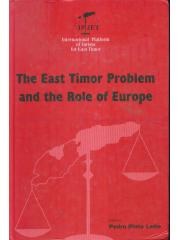

具体描述
This second book oi IPJET comes out at a crucial moment of East Timor s struggle
or self-determination. The economic, social and political turmoil in Indonesia, culminating
n Suharto s fall, has changed completely the environment of that struggle, but not its
raison d 8tre. I shall begin this introduction with a short explanation of why we have to
intensify our efforts for East Timor s liberation. Only then shall I dedicate some words tc
this book and its origin.
When Habibie took office as President of Indonesia someone in an Internet
~ewsgroup said he was no more than a ~unar~ w . At least concerning his basic stance
~n the question of East Timor, he seems to justify that nickname. In his own words or
Lhrough the mouth of his (previously Suharto s) Foreign Minister Alatas, he keeps saying,
as Suharto did, that East Timor is as an integral part of Indonesia, and that its annexation
is irreversible. Up to this point, nothing new.
What is indeed new is that Habibie and Alatas, forced by a stronger than ever
East Timorese resistance to the occupation, a growing solidarity with the Timor cause
among the Indonesian democratic opposition and signs that the United States and Western Europe are reviewing their position on the issue, have unwillingly brought the question
of the political status of the territory to the scene. For more than twenty years East Timor
was, according to the dictatorship in Jakarta, an internal affair of Indonesia. They were at
most prepared to discuss the human rights situation in the territory -this did not mean
that they were willing to improve it. Every time Suharto and Alatas mentioned East
Timor, theieemphasis was on the so-called development Indonesia was bringing to the
作者简介
目录信息
读后感
评分
评分
评分
评分
用户评价
读完合上书本的那一刻,留给我的不仅仅是知识的填补,更是一种深远的、挥之不去的沉思。这本书成功地将一个具体地区的历史悲剧,提升到了一个关于“国际干预的伦理边界”与“主权概念的当代价值”的宏大哲学层面。它引发了我对全球体系内在矛盾的再思考:在追求普遍价值的旗帜下,各国是如何在自身利益与道义责任之间进行算计和摇摆的?那些看似遥远的决策,是如何具体地塑造了远方人们的日常生活和命运轨迹的?这本书提供了一个极佳的案例研究,让我们得以窥见宏观政策制定背后的复杂人性与利益纠葛,其价值远超出一本单纯的历史或政治分析读物,更像是一面映照当代国际关系本质的棱镜。
评分从阅读的舒适度角度来说,此书的语言风格可谓是自成一派,兼具学术的严谨和文学的张力。它不像某些研究报告那样充斥着晦涩难懂的专业术语和生硬的行话,虽然其核心内容无疑是高度专业的,但作者似乎有一种天赋,能将那些错综复杂的国际法条文、外交辞令转化为流畅且富有节奏感的文字。阅读时,我常常有一种在跟随一位博学的朋友进行深度交谈的感觉,他知识渊博,逻辑清晰,但又不失风趣和洞察力。这种行文的流畅性,极大地降低了阅读门槛,使得即便是面对那些关于区域安全架构变动的艰深讨论,也能保持高度的专注和兴趣,让人不知不觉地翻过一页又一页。
评分整本书的论述逻辑构建得极为精妙,仿佛一位经验老到的建筑师在设计一座宏伟的知识殿堂。作者似乎没有急于抛出结论,而是采取了一种循序渐进、层层递进的叙事策略。开篇部分,它巧妙地回顾了影响深远的宏观历史背景,为理解后续的错综复杂性打下了坚实的基础。我尤其欣赏其对细节的把握,那些看似微不足道的政治角力、经济制裁的幕后推手,都被作者以抽丝剥茧般的笔法清晰地呈现出来。阅读过程中,我多次停下来,反复咀嚼那些精炼的段落,它们如同散落在知识旷野中的宝石,需要仔细辨认才能体会其光芒。这种结构安排,使得即便是对该议题了解不深的读者,也能逐步跟上作者的思维脉络,最终到达其深刻见解的核心地带,感受到知识的完整性和说服力的强大冲击。
评分这部书的封面设计非常引人注目,采用了深沉的蓝色调,配上简洁有力的白色字体,给人一种庄重而又富有思考性的感觉。光是拿起这本书,就能感受到它承载的厚重历史感。我特别喜欢它在排版上的用心,字体选择既易于阅读,又带着一种古典的韵味,让人在阅读过程中有一种沉浸式的体验。对于任何对国际政治格局,尤其是关注特定地区冲突与复杂地缘政治博弈的读者来说,这样的外在包装无疑是一个极佳的信号——这绝不是一本浮于表面的浅薄之作。它预示着接下来将是一场深入的、需要全神贯注的学术旅程。封面上的那一行作者署名,虽然我在此不便提及具体是谁,但其名字本身就暗示了其在该领域深厚的专业背景和长期的田野调查经验,这让我对接下来的内容充满了期待,仿佛已经闻到了那种夹杂着尘土与历史气息的研究报告的味道。
评分这本书最让我震撼的,是其在论证过程中所展现出的那种近乎冷酷的客观性与人道关怀之间的微妙平衡。作者显然投入了大量心血进行原始资料的挖掘和交叉验证,使得文本充满了来自不同当事方和多重视角的证据支撑。它没有简单地将任何一方描绘成绝对的“好人”或“坏人”,而是深刻剖析了权力运作的灰色地带,揭示了在复杂的国际关系机器中,理想主义常常如何被现实的铁律所吞噬和异化。这种不偏不倚的立场,反而赋予了这本书更强的批判力量。它不是在进行道德审判,而是在进行一种深层次的结构性解构,迫使读者跳出既有的意识形态框架,用一种全新的、更具穿透力的眼光去看待全球治理的困境。
评分 评分 评分 评分 评分相关图书
本站所有内容均为互联网搜索引擎提供的公开搜索信息,本站不存储任何数据与内容,任何内容与数据均与本站无关,如有需要请联系相关搜索引擎包括但不限于百度,google,bing,sogou 等
© 2026 book.wenda123.org All Rights Reserved. 图书目录大全 版权所有




















